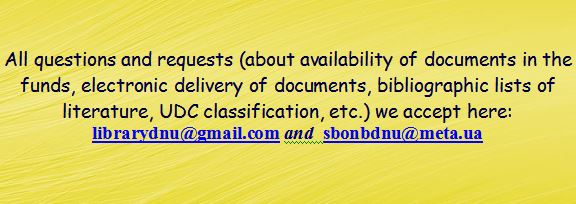|
20.12.2022__________
Virtual exhibition “Fine Britain: from the funds of
the Scientific University library”
“We can find common qualities and common values that have made Britain the country it is. Our belief is in tolerance and liberty which shines through British history. Our commitment to fairness, fair play and civic duty”.
(Gordon Brown)
For hundred of years, England has been one of the world’s most important countries. English inventors helped make possible the Industrial Revolution. English sailors, traders, explorers, and colonists helped found the British Empire – the largest empire in history. England also produced William Shakespeare, considered the greatest dramatist of all time, and Sir Isaak Newton, one of the most important scientist in history.
The English people have a long history of freedom and democracy. Their democratic ideas and practices have influenced many other countries, including Australia, Canada, India, many European countries, and the United States. Most English people take great pride in their country’s history and have deep respect for their customs and traditions.
I. History of England
“England will still be England, an everlasting animal, stretching into the future and the past and like all living things having the power to change out of all recognition and yet remain the same”.
(George Orwell)
Britain has been many centuries in making. The Romans conquered most of Britain, but were unable to subdue the fiercely independent tribes in the west and far north. Further waves of invaders followed: Angles, Saxons, Jutes, Vikings and the Norman. All these contributed to the mixture we call English. For many centuries this country was known simply as England. To the west and north, Wales and Scotland fought for their independence so passionately that it took hundreds of years to bring them under English dominion.
Since the eighteenth century Britain has included England, Wales and Scotland. Further west was England’s oldest colony, Ireland. The Irish won independence for greater part of their country in 1921, but Northern Ireland was divided from the rest and retained as part of the United Kingdom of Great Britain and Northern Ireland.
Important dates in England
A.D. 43 – Roman armies invaded Britain.
400’s – Germanic tribes invaded England.
597 – Saint Augustine of Canterbury brought Christianity to the people of southern Britain.
1066 – Norman forces conquered England after winning the Battle of Hastings.
1215 – English barons forced King John to agree to Magna Carta.
1282 – England conquered Wales.
1295 – Edward I called together the Model Parliament.
1314 – Scotland assured its independence from England by winning the Battle of Bannockburn.
1337-1453 – England fought the Hundred Year’s War with France and lost most of its lands on the European mainland.
1455-1485 – Two royal families fought for the throne in the Wars of the Roses.
1534 – Henry VIII made the king supreme head of the church in England.
1536 – Henry VIII united England and Wales.
1588 – An English fleet defeated the Spanish Armada.
1603 – England and Scotland were joined in a personal union under one king, James I.
1649-1659 – England became a Commonwealth and then a Protectorate.
1660 – Parliament restored the monarchy in England.
1688 – The Glorious Revolution ended James II’s rule.
1689 – Parliament passed the Bill of Rights.
1707 – England and Wales were united politically with Scotland, forming the Kingdom of Great Britain.
Important dates of the United Kingdom
1756-1763 – British armies defeated the French in India and Canada.
1798 – A rebellion in Ireland was suppressed.
1801 – An Act of Union formed the United Kingdom of Great Britain and Ireland.
1805 – Nelson won the Battle of Trafalgar, ending the risk of an invasion of Britain by Napoleon.
1815 – The Battle of Waterloo ended the Napoleonic Wars.
1833 – Slavery was banned throughout the British Empire.
1899-1902 – Britain fought the Boer War and annexed the Boer republics.
1914-1918 – Britain fought Germany and its allies in World War I.
1939-1945 – Britain fought Germany and Japan in World War II.
1956 – Britain and France attacked Egypt over the Suez Canal.
1973 – Britain joined the European Community.
1979 – Margaret Thatcher became Britain’s first woman prime minister.
1991 – British troops participated in the Persian Gulf War.
2022 – The death of the Queen Elizabeth II.
 |
9(42)
F35
Feiling K.
A History of England: From the Coming of the English to 1918 / K. Feiling. – London: Macmillan and CO.LTD, 1951. – 1229p.
1624562 ВІЛ
The primary purpose of this book is to tell the story in a narrative form, and to lay the emphasis on the period within which Britain became a great Power.
|
 |
9(42)
M87
Morton A.L.
A People’s History of England / A.L. Morton. – London: Lawrense and Wishart, 1968. – 565p.
1233875 ВІЛ
This is a history book which scholar and average reader alike will find absorbing, exciting and rich in content. It treats history not in terms of kings and dates and battles – nor yet in terms of dry economics – but in terms of people, showing how the English people shaped their own history and their social institutions from the time of the Norman Conquest.
There are 15 maps by J.F. Horrabin in this volume.
|
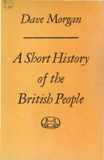 |
9(42)
M84
Morgan D.
A Short History of the British People / D. Morgan. – Leipzig: VEB Verlag Enzyklopadie, 1974. – 201p.
1057608 ВІЛ
This book contains material about the development of Britain and, in particular, of the British Labour movement. It is an attempt to explain the historical growth of some important features of British life. The Labour movement above all has a unique character which can only be understood by a study of its history.
|
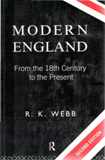 |
4. 9(42)
W37
Webb R.K.
Modern England: From the 18th Century to the Present / R.K. Webb. – London: Routledge, 1994. – 658p.
1627238 ВІЛ
This volume offers a comprehensive chronicle of English life since the middle of the eighteenth century, when it can be said that modern England begin to emerge with the development of reform movements, the Industrial Revolution and Romanticism.
This second edition has been extensively revised to reflect the latest advances in modern historical research and writing. Skillfully interweaving political, economic, social, intellectual and religious history, the author traces the course of England's transition from oligarchical to democratic forms of government and society. Throughout Professor Webb provides a wealth of colorful illustrative detail, and continually enriches his narrative with lively and often provocative analysis and insight.
|
 |
5. 9(42)
V69
Vincent J.
The Formation of the British Liberal Party 1857 – 1868 / J. Vincent. – London: Penguin Books, 1972. – 314p.
1625057 ВІЛ
This book describes how, at root level, the Parliamentary Whig Party developed into a national Liberal movement. The action takes place in the 1860s, and the leading parts played by a cluster of great men – Geadstone, Bright, Palmerston, Russell and Mill.
This volume could be interesting not only for students of history, but anyone who wants to understand the nature and development of British politics.
|
II. II. English Literature
"It is in literature that the concrete outlook of humanity receives its expression"
(Alfred North Whitehead)
|
English literature consists of the poetry, prose, and drama written in English language by authors in England, Scotland and Wales. Each of the countries, but especially England, has produces outstanding writers, William Shakespeare, and Charles Dickens are only two of the great names in English literature.
English literature is a rich literature. It includes masterpieces in many literary forms, particularly the novel, the short story, epic and lyric poetry, the essay, literary criticism, and drama. English literature is also one of the oldest national literatures in the Western world. English authors wrote important literary works as early as A.D. 700's.
English authors have always been deeply interested in the political and social conditions of their times. In their works, they have described, criticized, and commented on the society in which they lived. During the 1800's, for example, gifted writers such as George Eliot used their novels to promote economic, political, and social reforms.
|
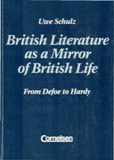 |
1. 82
S39
Schulz Uwe
British Literature as a Mirror of British Life: From Defoe to Hardy / U. Schulz. – Berlin: Cornelsen, 1992. – 144p.
1626228 ВІЛ
The aims and purposes of this book are manyfold. First of all, it intends to introduce the great tradition and development of the English novel, the most popular and most prolific of all English literary forms.
The reader of this volume will find some personal profit and pleasure in reading and studying "British Literature", which acquaints him with English novelists of rank who have very often held first places in world literature.
|
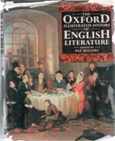 |
82(03)
O-97
The Oxford Illustrated History of English Literature / ed. P. Rogers. – Oxford: Oxford University Press, 1987. – 528p.
1233912 ВІЛ
Britain possesses a literary heritage which is almost unrivalled in the Western world. In this lavishly illustrated volume, the richness, diversity, and continuity of that tradition are explored, by a group of Britain's foremost literary scholars under the General editorship of Professor Pat Rogers. Chapter by chapter the authors trace the history of English literature, from its first stirrings in Anglo-Saxon poetry to the 20th century. At its heart towers the figure of Shakespeare, who is accorded a special chapter to himself. Other major figures such as Chaucer, Milton, Donne, Wordsworth, Dickens, Eliot, and Auden are treated in depth, and the story is brought right up to date with discussion of authors, such as Seamus Heaney and Edward Bond.
But this is much more than a mere chronicle. The book provides a basic core of information and invaluable supplementary material – suggestion for further reading, maps, a chronological table of dates, and a detailed index with birth and death-dates of individuals listed.
|
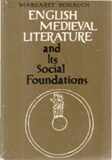 |
82
S31
Schlauch Margaret
English Medieval Literature and Its Social Foundations / M. Schlauch. – London Oxford: University Press, 1967. – 366p.
698973 ВІЛ
This book is intended for students and amateurs of medieval English literature wishing to obtain an initial general view of the subject. The treatment has had to be broad rather than detailed, therefore, and the bibliographical references make no pretension to exhaustiveness. At the same time an effort has been made to include such items as would enable a student to embark on the further study of any special theme for himself. To this end basic editions have been noted, and also a choice of leading articles and monographs. Emphasis has been places on recent contributions, since these studies often include summaries of previous research, with annotations.
|
 |
И(42)
N87
The Norton Anthology of English Literature. / ed. M.H. Abrams. – 6th edition. – V.1: The Middle Ages. The Sixteenth Century. The Early Seventeenth Century. The Restoration and the Eighteenth Century. - New York. London: W.W. Norton and Company, 1993. – 2586p.
1654073 ВІЛ
The anthology is designed for indispensable courses that introduce students to the unparalleled excellence and variety of English literature. Its criteria remain those announced in the original edition: 1) that, the study in depth of achievements by the major writers in prose and verse, in the context of the chief literary types and tradition of each age; 2) that these works be so far as feasible complete, and also abundant enough to allow instructors to choose from the total those that each one prefers to teach; 3) that the student be provided the most reliable texts available, edited so as to expedite understanding, in a format inviting to the eye; 4)that introductions, glosses, and other informative materials be adequate to free the student from dependence on reference books, so that the anthology may be read anywhere – in the student's room, on a bus, or under a tree.
This volume contains the works from the old English period to the 18th century.
|
 |
И(42)
N87
The Norton Anthology of English Literature. / ed. M.H. Abrams. – 6th edition. – V.2: The Romantic Period. The Victorian Age. The Twentieth Century. – New York. London: W.W. Norton and Company, 1993. – 2543p.
1654074 ВІЛ
This volume contains the literary works from the 18th to the 20th century.
|
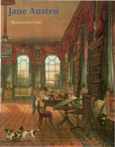 |
8
L35
Laski Marghanita
Jane Austen / M. Laski. – London: Thames and Hudson, 1997. – 143p. 137 illustrations. – (Thames and Hudson Literary Lives).
1654774 ВІЛ
The novelist and critic Marghanita Laski brings to this illustrated (137 illustrations) biography the fruits of a long and loving study of Jane Austen (1775 - 1817), her work, letters, and her time. |
 |
82
N58
Nichol John
Byron / J. Nichol. – New York: AMS Press, 1968. – 216p.
1624744 ВІЛ
This book is about different periods of life and creative activity of English romantic poet George Gordon Byron (1788 - 1824).
|
|
Literature for the book exhibition "Exquisite England: from the funds of the Scientific University Library"
The exhibition was prepared by leading librarian Janina Stets
Home
|

